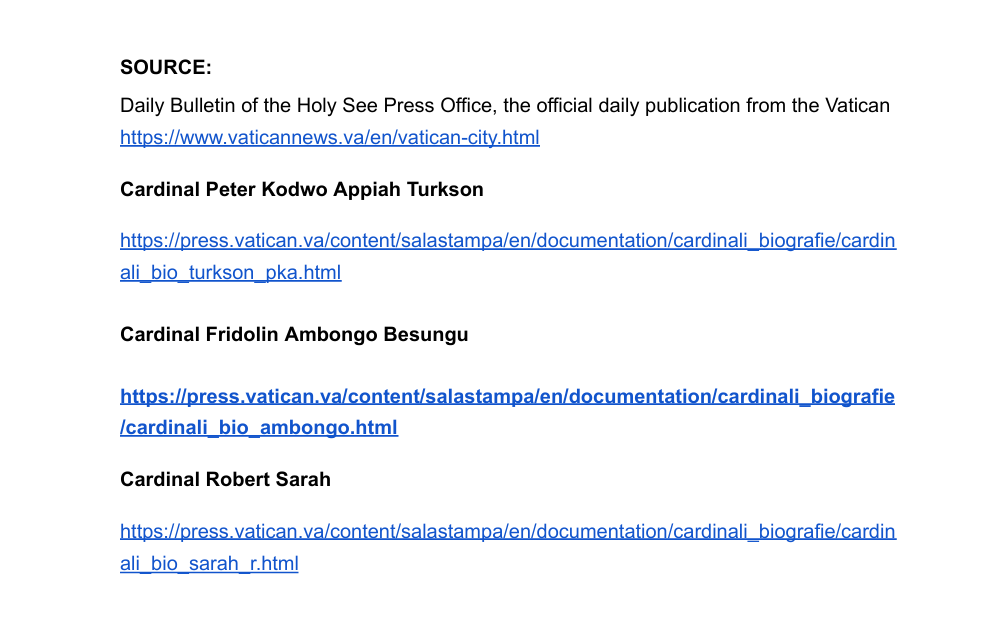As the world’s 1.4 billion baptised Roman Catholics look on and await the choice of their next leader, the decision is poised to shape the future of the Church and its global impact. While the College of Cardinals gear up to meet in the immortal halls of the Sistine Chapel, the question lingers: could this conclave be a historic opportunity, with the election of an African pope?
The process, traditional and notoriously unpredictable, is expected to be especially wide open this time. Now, with 80% of the cardinals appointed by the late Pope Francis, who promoted a more inclusive and globally representative Church, the stage is set for a conclave that reflects the global nature of Catholicism.
As speculation intensifies over who will next lead the world’s largest religious body, following the death of Pope Francis on Easter Monday, several names are doing the rounds as possible successors.
Among that cadre of spiritual leaders, three African cardinals are trumpeted as candidates, each bringing their own perspective and unique background to this historic moment.
To understand the dynamics of this pivotal moment, to appreciate the landscape of this historic moment, let’s take a closer look at the profiles of those leading African contenders.
Cardinal Peter Kodwo Appiah Turkson (Ghana): A Diplomat for a Changing World
Cardinal Peter Turkson of Ghana, who has a long career in diplomacy and a keen view of global development issues, is an obvious candidate. It is undeniable that he was and is capable of traversing the complex geopolitical landscape facing the Church today.
Whether you consider his work on ethical finance, in dealing with the plight of refugees, or in the immediate threat posed by climate change, Cardinal Turkson’s understanding of these global affairs is critical and makes him someone who would be able to link the Church with the circumstances of today’s world. His age, 76, though, may give some colleagues in the College of Cardinals pause.
Cardinal Fridolin Ambongo Besungu (DR Congo): Champion of Social Justice
Now retired and known as the Archbishop Emeritus of Kinshasa, Cardinal Fridolin Ambongo Besungu of the Democratic Republic of Congo has emerged perhaps as the single strongest voice on behalf of social justice and the marginalised.
His frank appeals for human rights, environmental responsibility and anti-corruption have resonated well beyond the African continent.
The emergence of Cardinal Ambongo, part of a younger generation of Church leaders who embody the vibrancy and energy of the African Catholic community at a time of phenomenal growth, represents an important development for the Church in Africa. His very close relationship with the late Pope Francis, whom he ascended to the cardinalate, could benefit him in the next conclave.
Cardinal Robert Sarah (Guinea): Guardian of Tradition
Finally, Cardinal Robert Sarah of Guinea, a highly respected figure in the Church, stands for a more traditionalist wing.
His long and distinguished service in the Vatican where he rose to Prefect of the Congregation for Divine Worship has further established him as a defender of liturgical tradition.
His solid theological convictions and orientation of continuity with the Church’s history may attract some cardinals who long for a return to the conservative past.
The Conclave’s True Calculus: More Than Just Geography
The recent reshaping of the College of Cardinals, a direct result of Pope Francis’s appointments, has undeniably put potential African popes front and centre.
However, whatever transpires when the cardinals finally come together for the next conclave will be a balancing act. It won’t be purely strategic, but will involve deep, personal prayer and reflection as well. These are men who, from every corner of the world, represent the Catholic Church, and you can bet they will be doing a fair amount of praying together.
The College of Cardinals will carefully evaluate each prospective leader’s theological knowledge. They will also take into consideration their ability to lead and reflect on their pastoral vision for the Church’s future work. This work is in our fast-changing world.
The selection of a Pope is more than geography. It focuses on identifying the person blessed with wisdom and demonstrates strength of character. That person needs spiritual depth, too. Such guidance is imperative to unite Catholics around the world.
Ultimately, the choice of the new Vicar of Christ will not simply rest on a continent on the rise. Instead, it will emerge from the collective wisdom of the College of Cardinals.
They seek divine inspiration. They are picking a shepherd for their enormous flock. This is a decision rooted in centuries of tradition. It also resonates with prayer fervour. The final decision will have ramifications across communities globally. It will influence the spiritual path for billions. It will renew the timeless universality of the Catholic Church.
Beyond the Forefront: A Wider View of Papal Contenders
The world’s attention has understandably turned to these powerful African cardinals. However, it’s important to remember they’re not the only key contenders in this consequential decision. There are many other deeply respected men within the College of Cardinals around the world. These men have been shaped by their own journeys and understanding. They are also in the running to guide the Church through this crucial juncture.
The discussions and deliberations will happen behind closed doors of the conclave. They will be conducted in the deepest secrecy and animated by sincere prayer. The personal conscience of each voting cardinal will also guide them.
Thus, the outcomes are far less clear. The evolving composition of the College does indeed suggest some interesting future potential.
However, the identity of the successor is still ultimately a matter of profound spiritual discernment. It is a choice that will end up surprising us all. This will happen regardless of how much we speculate from the outside.

DISCLAIMER: The Views, Comments, Opinions, Contributions and Statements made by Readers and Contributors on this platform do not necessarily represent the views or policy of Multimedia Group Limited.


